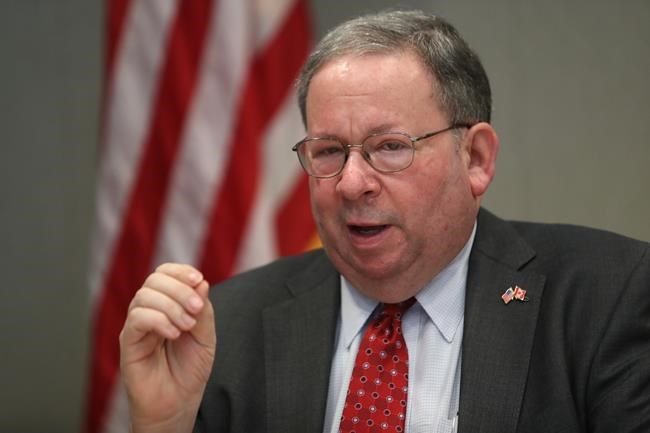WASHINGTON — sa国际传媒 threw a "hissy fit" over President Joe Biden's original plan to boost the sales of American-made electric vehicles, the U.S. envoy to Ottawa said Wednesday as he insisted that his country is not out to undermine its largest trading partner.
The stated goal of David Cohen's appearance at the Wilson Center's sa国际传媒 Institute in Washington, D.C., was to finally put to rest the persistent Canadian fear that's conjured every time his boss utters the words "Buy American."
But his characterization of sa国际传媒's months-long, ultimately successful bid to be carved in to Biden's tax-credit scheme, which originally reserved the sweetest plums for union-built vehicles assembled in the U.S., is likely to raise some eyebrows.
"sa国际传媒, using a technical term, threw a hissy fit," Cohen said of the reaction, upon his arrival in Ottawa in December 2021, to Biden's original suite of tax incentives.
He said he was taken aback to hear Canadian stakeholders and the federal government both saw the plan as an "existential threat" to sa国际传媒's auto sector — and even more surprised to learn sa国际传媒 was not yet building EVs.
"I went to my friends in sa国际传媒 and said … 'I'm struggling to understand how the inapplicability of a tax credit, to a segment of your industry that currently produces no vehicles that are eligible for it, is an existential threat to the entire Canadian economy."
The "less jazzy" explanation he got, Cohen said, was that the private sector would never opt to invest in an emerging industry in sa国际传媒 when the U.S. was putting up such enticing incentives just south of the border.
"So I said, 'Well, you know something? That's a fair argument. Why don't you use that argument?'" Cohen said.
"So they adjusted their advocacy in private, in a very appropriate and a very good way, and now electric vehicles manufactured or assembled in sa国际传媒 are written in to the (Inflation Reduction Act) as being eligible for the tax credit."
Cohen cited that fact as just some of the evidence that the U.S. is not out to punish sa国际传媒, but rather to "build a resilient, powerful, prosperous North American economy."
From the outset of his speech, Cohen said he was out to debunk the perception in sa国际传媒 — "noise," he called it — that the administration's legislative priorities are rooted in "the alleged protectionist policies of the United States."
He cited the administration's signature victories, including the Bipartisan Infrastructure Law, the Inflation Reduction Act (IRA), the CHIPS and Science Act and the existing Defense Production Act as evidence to the contrary.
"I've said that I think this view is the product of largely uninformed opinion. That's me being diplomatic," Cohen said.
"So I want to take this opportunity to be clear, to be absolutely clear: America is not pursuing protectionist trade policies, and any intimation that these programs and legislation are protectionist could not be further from the truth."
As evidence, he cited the sheer magnitude of the sa国际传媒-U.S. trade relationship: C$3.25 billion in trade between the two countries each day, supporting millions of jobs in both, and growing by 19 per cent year over year in 2022.
He noted, as Biden often does, that Buy American policies have been on the books in the U.S. since the 1930s. They are limited to federal procurement projects, with no explicit impact on private commercial trade, and resemble similar procurement rules that exist in other countries, including sa国际传媒.
He didn't mention "Buy America," a separate set of regulations that apply to state and municipal infrastructure projects that include funding from federal departments and agencies — and which are often the bigger concern in sa国际传媒.
The infrastructure bill, passed in 2021, includes procurement spending that totals less than one per cent of the overall U.S. economy, and represents a tiny fraction of overall sa国际传媒-U.S. trade, Cohen noted.
He also mentioned the US$250 million currently available to Canadian critical mineral operations under the Defense Production Act, which has long allowed Canadian companies to be designated as domestic producers in matters of national security.
And he cited the specific example of Li-Cycle, a Toronto-based lithium battery recycling operation that's building a new plant in Rochester, N.Y., with more than US$370 million worth of help from the U.S. Department of Energy, thanks to the IRA.
"They don't feel like they're being hurt by Buy American," said Cohen, who said he met Li-Cycle executives at a recent conference in D.C.
"Buy American didn't stop them from getting a $370-million grant from the United States government. And they're not discouraged at all in applying for additional funding to support their lithium recycling business."
This report by The Canadian Press was first published May 3, 2023.
James McCarten, The Canadian Press



